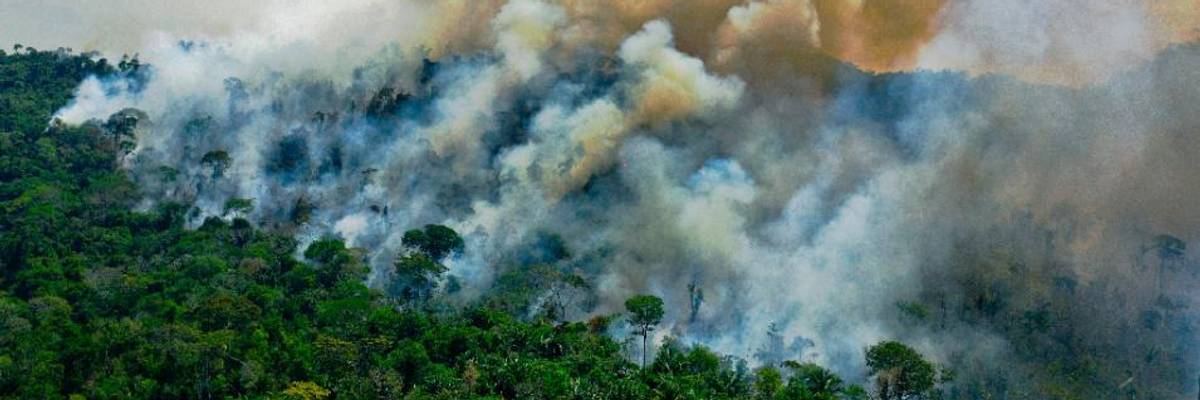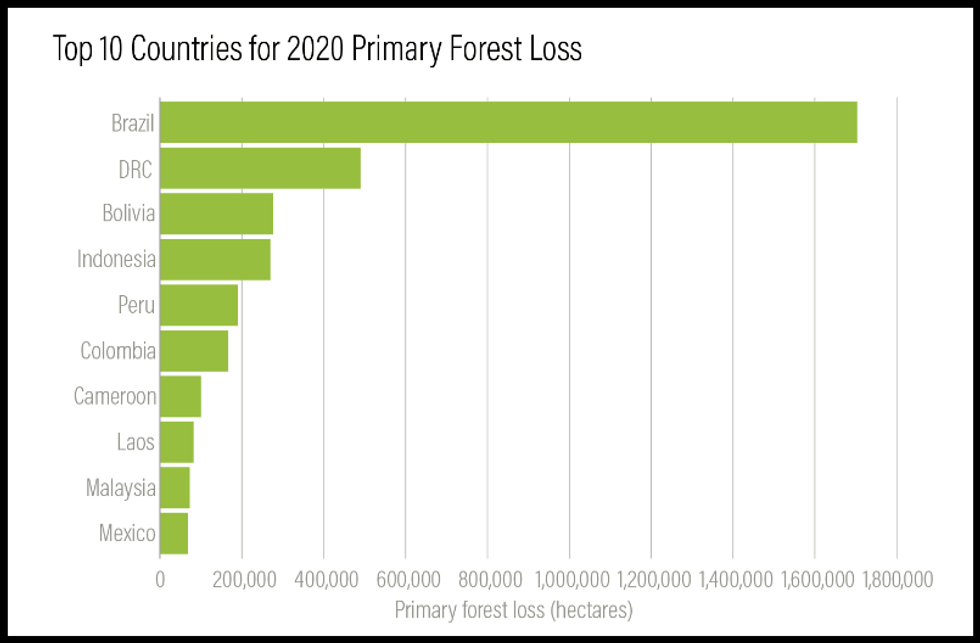

SUBSCRIBE TO OUR FREE NEWSLETTER
Daily news & progressive opinion—funded by the people, not the corporations—delivered straight to your inbox.
5
#000000
#FFFFFF
To donate by check, phone, or other method, see our More Ways to Give page.


Daily news & progressive opinion—funded by the people, not the corporations—delivered straight to your inbox.

Aerial view of a burning area of Amazon rainforest reserve south of Novo Progresso in Para state on August 16, 2020. (Photo: Carl de Souza/AFP via Getty Images)
Intentional deforestation as well as drought-induced wildfires made more frequent and severe by the climate crisis drove a significant acceleration of global rainforest loss in 2020, with new figures released Wednesday showing that 12.2 million hectares of tree cover were destroyed in the tropics last year.
According to data from the University of Maryland and Global Forest Watch, 4.2 million hectares--an area the size of the Netherlands--of destruction occurred among humid tropical primary forests. Scientists say this level of loss is a major blow to the planet's biodiversity and a setback for the fight against the global climate crisis, given the crucial role rainforests play in absorbing atmospheric CO2.
"The resulting carbon emissions from this primary forest loss (2.64 Gt CO2) are equivalent to the annual emissions of 570 million cars, more than double the number of cars on the road in the United States," noted Mikaela Weisse and Liz Goldman of Global Forest Watch, an initiative of the World Resources Institute (WRI).
"As in past years, commodity-driven deforestation was the leading cause of tree cover loss (both in primary and secondary forests) in Latin America and Southeast Asia, while shifting agriculture dominates in tropical Africa," the pair observed. "In addition, fires and other climate-related impacts continued to play a big role, both in the tropics and beyond."
Last year was third-worst year for forest destruction since 2002, with the loss of primary forest--defined as areas undisturbed by human activity--up 12% compared to 2019.
Brazil--where Amazon deforestation has surged under the leadership of far-right President Jair Bolsonaro--led the world in primary forest loss in 2020, according to the new figures. Two bright spots in an otherwise dire report were Indonesia and Malaysia, where primary forest loss declined for the fourth consecutive year.
"While there is reason to celebrate this decline in primary forest loss, Indonesia and Malaysia must do more to strengthen existing policies to ensure this trend continues, including extending the oil palm plantation license moratorium which is set to expire in 2021," wrote Weisse and Goldman. "Regional climate and market conditions also may have reduced pressure on forests--conditions that could shift and, without the right measures in place, undo progress."

Frances Seymour, distinguished senior fellow at WRI, warned Wednesday that continued forest destruction "represents a crisis for climate stability and biodiversity conservation, as well as a humanitarian disaster and lost economic opportunity.
"What we can see from satellites is that when Indigenous peoples are present in forests and their rights are strengthened, forest cover is maintained," Seymour wrote. "Yet the number of forest defenders being murdered is rising along with the rate of forest loss. With global climate summits on climate change and biodiversity on the calendar, 2021 is a year for solidarity among governments committed to averting the worst impacts of forest loss."
"It's also time," Seymour added. "for solidarity with the communities risking their lives to save the world's remaining forests."
Dear Common Dreams reader, The U.S. is on a fast track to authoritarianism like nothing I've ever seen. Meanwhile, corporate news outlets are utterly capitulating to Trump, twisting their coverage to avoid drawing his ire while lining up to stuff cash in his pockets. That's why I believe that Common Dreams is doing the best and most consequential reporting that we've ever done. Our small but mighty team is a progressive reporting powerhouse, covering the news every day that the corporate media never will. Our mission has always been simple: To inform. To inspire. And to ignite change for the common good. Now here's the key piece that I want all our readers to understand: None of this would be possible without your financial support. That's not just some fundraising cliche. It's the absolute and literal truth. We don't accept corporate advertising and never will. We don't have a paywall because we don't think people should be blocked from critical news based on their ability to pay. Everything we do is funded by the donations of readers like you. Will you donate now to help power the nonprofit, independent reporting of Common Dreams? Thank you for being a vital member of our community. Together, we can keep independent journalism alive when it’s needed most. - Craig Brown, Co-founder |
Intentional deforestation as well as drought-induced wildfires made more frequent and severe by the climate crisis drove a significant acceleration of global rainforest loss in 2020, with new figures released Wednesday showing that 12.2 million hectares of tree cover were destroyed in the tropics last year.
According to data from the University of Maryland and Global Forest Watch, 4.2 million hectares--an area the size of the Netherlands--of destruction occurred among humid tropical primary forests. Scientists say this level of loss is a major blow to the planet's biodiversity and a setback for the fight against the global climate crisis, given the crucial role rainforests play in absorbing atmospheric CO2.
"The resulting carbon emissions from this primary forest loss (2.64 Gt CO2) are equivalent to the annual emissions of 570 million cars, more than double the number of cars on the road in the United States," noted Mikaela Weisse and Liz Goldman of Global Forest Watch, an initiative of the World Resources Institute (WRI).
"As in past years, commodity-driven deforestation was the leading cause of tree cover loss (both in primary and secondary forests) in Latin America and Southeast Asia, while shifting agriculture dominates in tropical Africa," the pair observed. "In addition, fires and other climate-related impacts continued to play a big role, both in the tropics and beyond."
Last year was third-worst year for forest destruction since 2002, with the loss of primary forest--defined as areas undisturbed by human activity--up 12% compared to 2019.
Brazil--where Amazon deforestation has surged under the leadership of far-right President Jair Bolsonaro--led the world in primary forest loss in 2020, according to the new figures. Two bright spots in an otherwise dire report were Indonesia and Malaysia, where primary forest loss declined for the fourth consecutive year.
"While there is reason to celebrate this decline in primary forest loss, Indonesia and Malaysia must do more to strengthen existing policies to ensure this trend continues, including extending the oil palm plantation license moratorium which is set to expire in 2021," wrote Weisse and Goldman. "Regional climate and market conditions also may have reduced pressure on forests--conditions that could shift and, without the right measures in place, undo progress."

Frances Seymour, distinguished senior fellow at WRI, warned Wednesday that continued forest destruction "represents a crisis for climate stability and biodiversity conservation, as well as a humanitarian disaster and lost economic opportunity.
"What we can see from satellites is that when Indigenous peoples are present in forests and their rights are strengthened, forest cover is maintained," Seymour wrote. "Yet the number of forest defenders being murdered is rising along with the rate of forest loss. With global climate summits on climate change and biodiversity on the calendar, 2021 is a year for solidarity among governments committed to averting the worst impacts of forest loss."
"It's also time," Seymour added. "for solidarity with the communities risking their lives to save the world's remaining forests."
Intentional deforestation as well as drought-induced wildfires made more frequent and severe by the climate crisis drove a significant acceleration of global rainforest loss in 2020, with new figures released Wednesday showing that 12.2 million hectares of tree cover were destroyed in the tropics last year.
According to data from the University of Maryland and Global Forest Watch, 4.2 million hectares--an area the size of the Netherlands--of destruction occurred among humid tropical primary forests. Scientists say this level of loss is a major blow to the planet's biodiversity and a setback for the fight against the global climate crisis, given the crucial role rainforests play in absorbing atmospheric CO2.
"The resulting carbon emissions from this primary forest loss (2.64 Gt CO2) are equivalent to the annual emissions of 570 million cars, more than double the number of cars on the road in the United States," noted Mikaela Weisse and Liz Goldman of Global Forest Watch, an initiative of the World Resources Institute (WRI).
"As in past years, commodity-driven deforestation was the leading cause of tree cover loss (both in primary and secondary forests) in Latin America and Southeast Asia, while shifting agriculture dominates in tropical Africa," the pair observed. "In addition, fires and other climate-related impacts continued to play a big role, both in the tropics and beyond."
Last year was third-worst year for forest destruction since 2002, with the loss of primary forest--defined as areas undisturbed by human activity--up 12% compared to 2019.
Brazil--where Amazon deforestation has surged under the leadership of far-right President Jair Bolsonaro--led the world in primary forest loss in 2020, according to the new figures. Two bright spots in an otherwise dire report were Indonesia and Malaysia, where primary forest loss declined for the fourth consecutive year.
"While there is reason to celebrate this decline in primary forest loss, Indonesia and Malaysia must do more to strengthen existing policies to ensure this trend continues, including extending the oil palm plantation license moratorium which is set to expire in 2021," wrote Weisse and Goldman. "Regional climate and market conditions also may have reduced pressure on forests--conditions that could shift and, without the right measures in place, undo progress."

Frances Seymour, distinguished senior fellow at WRI, warned Wednesday that continued forest destruction "represents a crisis for climate stability and biodiversity conservation, as well as a humanitarian disaster and lost economic opportunity.
"What we can see from satellites is that when Indigenous peoples are present in forests and their rights are strengthened, forest cover is maintained," Seymour wrote. "Yet the number of forest defenders being murdered is rising along with the rate of forest loss. With global climate summits on climate change and biodiversity on the calendar, 2021 is a year for solidarity among governments committed to averting the worst impacts of forest loss."
"It's also time," Seymour added. "for solidarity with the communities risking their lives to save the world's remaining forests."